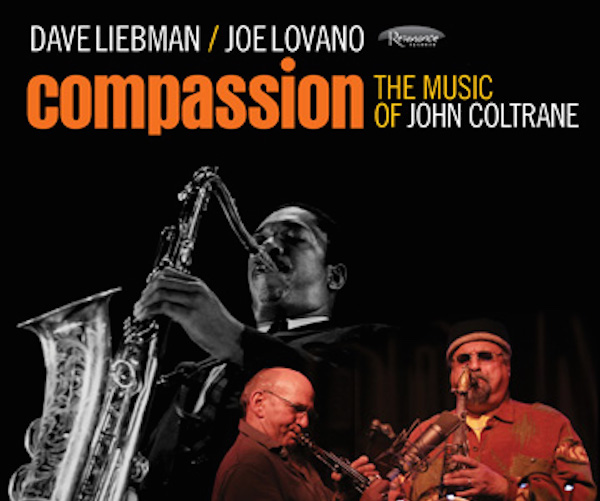Jazz CD Review: “Compassion” — A Deft Homage to John Coltrane
Of course, neither saxophonist sounds precisely like Coltrane: there would be no point in trying.
Dave Liebman/ Joe Lovano– Compassion: The Music of John Coltrane. (Resonance Recordings)

By Michael Ullman
The first time I saw saxophonist (and, on this recording, flutist and recorder player) Dave Liebman, he was performing with Miles Davis. It was around 1973. At one point, while Davis took an intense solo, Liebman stood beside him and listened hard. He seemed totally engrossed. When Davis finished, the trumpeter nodded to Liebman and pointed his head at the microphone. He was inviting Liebman to solo, but the saxophonist shook his head, no. Davis looked amused. Decades later, I mentioned this to Liebman and he said wonderingly, “I said no to the boss?”
I like to think it was his reverence for high artistry that made Liebman hesitant to intrude on what Miles Davis had laid down. It’s a kind of reverence — and seriousness — that I hear in this new disc dedicated to John Coltrane. (This year marks the 50th anniversary of his death.) The session with co-leader Joe Lovano, pianist Phil Markowitz, bassist Ron McClure, and drummer Billy Hart, was recorded by the BBC on June 22, 2007. That fall, Lovano and Liebman would continue their series of sessions with the group they called Saxophone Summit, a band that went back to 1999, when it was co-led by Lovano, Liebman, and Michael Brecker. Their recordings include 2004’s Gathering of Spirits, made with Coltrane’s son Ravi. Coltrane’s music, Liebman says, is part of his DNA. By 2007, he had already made at least four tribute albums to Trane, including one with Wayne Shorter.
Compassion is a new release. It was evidently an impromptu session, but it includes compositions from nearly the whole range of Coltrane’s astonishingly short 12 year career as a leader. Liebman explains that the chronological choice was not intentional. What was intentional is the enthusiasm with which the disc’s saxophonists embrace the freedom in Coltrane’s compositions, a liberation that they expand on and then personalize. The disc begins with “Locomotion” from Coltrane’s Blue Train, which was recorded in 1958, when Coltrane was performing with Thelonious Monk. A two-part ballad medley follows; Lovano plays “Central Park West” and Liebman takes on “Dear Lord.” The first tune was recorded by Coltrane in 1960; “Dear Lord” in 1965.
It is natural to focus on the saxophonists in this recording, but the lovely solos and transitions by pianist Phil Markowitz should also be praised. “Olé” begins with an impromptu conversation between Lovano’s flutes and recorder over the gentle intrusions of the rhythm section. Then bassist McClure inserts a steady beat that leads to a duet between the saxophonists. On this cut, many of the now (comfortably) inevitable techniques and sounds introduced by Coltrane’s sax can be heard: the swirling patterns, overblowing, and piercing altissimo shrieks. But there’s the meditative side of Coltrane as well, illustrated here in the longest number on the disc, “Compassion,” which is kicked off by Billy Hart’s nimble drum solo. “Compassion”‘s melody is played via a throbbing unison created in part by Lovano’s odd double soprano. Of course, neither saxophonist sounds precisely like Coltrane: there would be no point in trying. These are distinctive jazz masters are work: Lovano’s sound is lighter than Trane’s, while Liebman’s approach is decidedly more indirect, oblique.
Coltrane performances in his final years were not easy to understand, but no one doubted his sincerity. In his interview in Compassion‘s album notes, Hart talks about confronting Coltrane at the end of one of his later performances, which the drummer found to be dauntingly “advanced.” “What are you gonna do about how people feel about your music?” he asked. Coltrane responded. “You know, Billy, I don’t know what I’m gonna do, but I know I can’t stop.” Then, more intriguingly, the saxophonist added, “I’m just trying to clean up. You can imagine if you didn’t take a bath for 20 years how dirty you would be. I’m just trying to clean up.”
“I just know that good can only bring good,” Coltrane once said about his struggle for excellence. This session is, in Trane’s sense, another opportunity seized to compound the wealth the musician left us.
Michael Ullman studied classical clarinet and was educated at Harvard, the University of Chicago, and the U. of Michigan, from which he received a PhD in English. The author or co-author of two books on jazz, he has written on jazz and classical music for The Atlantic Monthly, The New Republic, High Fidelity, Stereophile, The Boston Phoenix, The Boston Globe, and other venues. His articles on Dickens, Joyce, Kipling, and others have appeared in academic journals. For over 20 years, he has written a bi-monthly jazz column for Fanfare Magazine, for which he also reviews classical music. At Tufts University, he teaches mostly modernist writers in the English Department and jazz and blues history in the Music Department. He plays piano badly.
Tagged: Compassion, Dave Liebman, Joe Lovano, John-Coltrane, Michael Ullman
